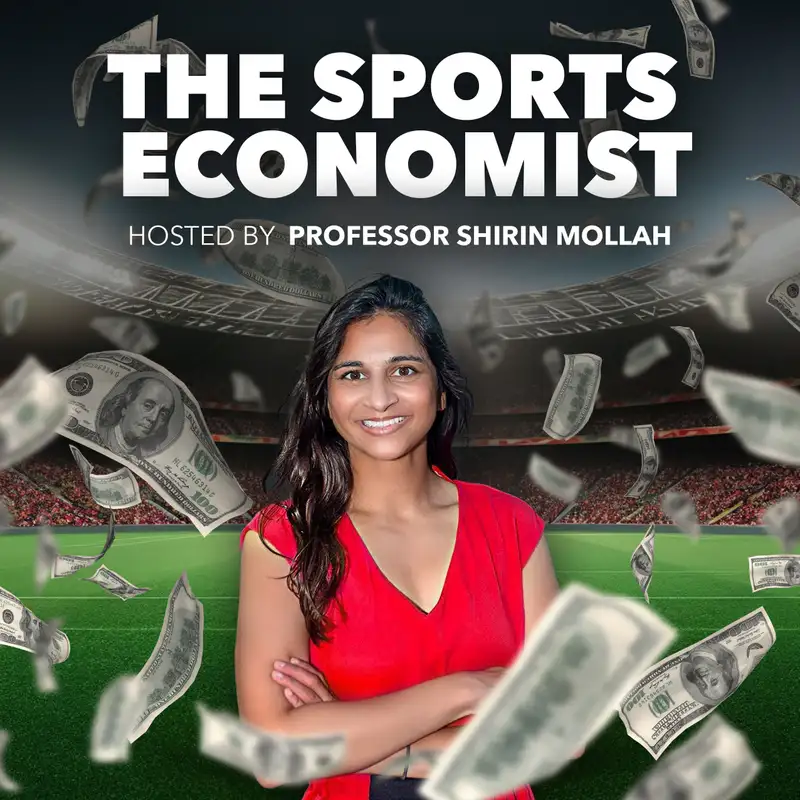 Episode 1
Episode 1
· 05:11
00:00
Welcome to the Sports Economist, the podcast where we dive deep into sports economics. I'm your host, Dr. Shirin Mollah, and today we're diving deep into the fascinating concept of comparative advantage. Comparative advantage is an economics principle that explains how individuals or groups can benefit by specializing in what they do best. This concept helps explain why some athletes or teams focus on specific roles or strategies. For one to have a comparative advantage,
00:28
they must have the lowest opportunity cost. Take basketball for example. Imagine a player who is great at both shooting and defense, but excels relatively more at shooting. Meanwhile, a teammate might be average at both shooting and defense, but relatively better at defense. By specializing in their respective strengths, they contribute more efficiently to the team's overall success. Then there's the concept of comparative advantage in team's...
00:57
Let's take the example of baseball, where the concept of a designated hitter in American League allows teams to maximize offensive output by allowing a skilled batter to focus on only hitting, while a pitcher concentrates on pitching without worrying about the batting performance. So we actually look at comparative advantage in economics at the country level. When we're looking at the country level, it relates back to trade.
01:26
If a country specializes in one product, they can focus on just producing that and exporting the good. Let's just say that another country can specialize in another product and import to the other country. What happens is that they spend all of their resources, their time on producing this good, and they can trade. When they trade, they're actually gaining from trade rather than producing both of the goods and expending energy.
01:55
and resources on those two goods. Then there's the comparative advantage in sports at the global scale. Certain nations excel in specific sports due to factors such as climate, culture, and available resources. Jamaica, for example, has a comparative advantage in sprinting due to strong tradition, high altitude training benefits, and talent development programs. Meanwhile, Scandinavian countries like Norway and Sweden,
02:22
focus on winter sports, leveraging their natural conditions and infrastructure to produce world-class skiers and biathletes. Then there's comparative advantage in hosting mega events such as the Olympics. For example, Los Angeles and their infrastructure. Los Angeles was the first city to experience a surplus in the 1984 Olympics. Why do some countries dominate at Olympic sports? For example, Australia in swimming, Japan in judo, France in fencing, Japan in sprinting,
02:52
Kenya and long distance running, China and table tennis, and South Korea and archery. There's the idea of opportunity. In Australia, there's sunshine, ocean beaches, and the country is wealthy enough to build many swimming pools. Then there's the concept of comparative advantage, where a country that has developed a small edge in a particular sport can leverage it to build a capacity more efficiently. Early success, such as legendary swimmers, can contribute by training new young talent,
03:22
creating a cycle of early talent identification and sustained success. Then there's the business side of comparative advantage. In the business side of sports, some leagues and franchises focus on merchandising and branding while others emphasize player development and scouting. European soccer clubs often specialize in developing young talent and selling players for profit. While American sports franchises maximize revenue through broadcasting rights and sponsorship deals.
03:50
Athletes and teams that recognize and leverage their compared advantage can maximize their potential. Whether it's an NFL team focusing on a strong defensive line or an Olympic swimmer honing their freestyle stroke, specialization allows for greater efficiency and success. The most recent example here is when the LA Dodgers won the 2024 World Series. It's a big win to the city, especially with the rivals such as the New York Yankees. They've been rivals for years and both have strong
04:19
fan bases. The LA Dodgers player Shohei Otani is an anomaly to the comparative advantage. Bringing him an upper hand to the game, he excels at both hitting and pitching. A rare case, one that we've actually seen with Babe Ruth. Each person has a specialization and coming together as a team, we can achieve the best outcome. So next time you're watching your favorite sport, think about how comparative advantage plays a role in what you're seeing on the field, court, or track.
04:48
Until next time, teammates, I'm Dr. Shirin Mollah, and this is a sports economist. If you enjoyed today's discussion, be sure to subscribe and leave us a review, and don't forget to follow us on social media for insights in the fascinating world of sports economics. Thanks for tuning in, and we'll see you next time.
Listen to The Sports Economist using one of many popular podcasting apps or directories.